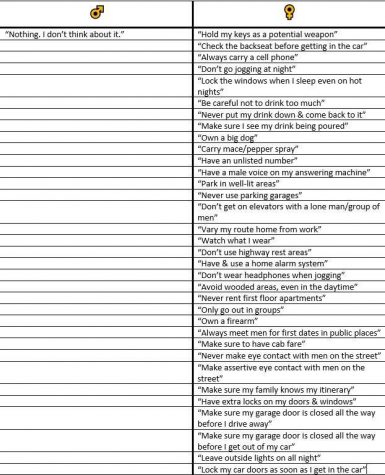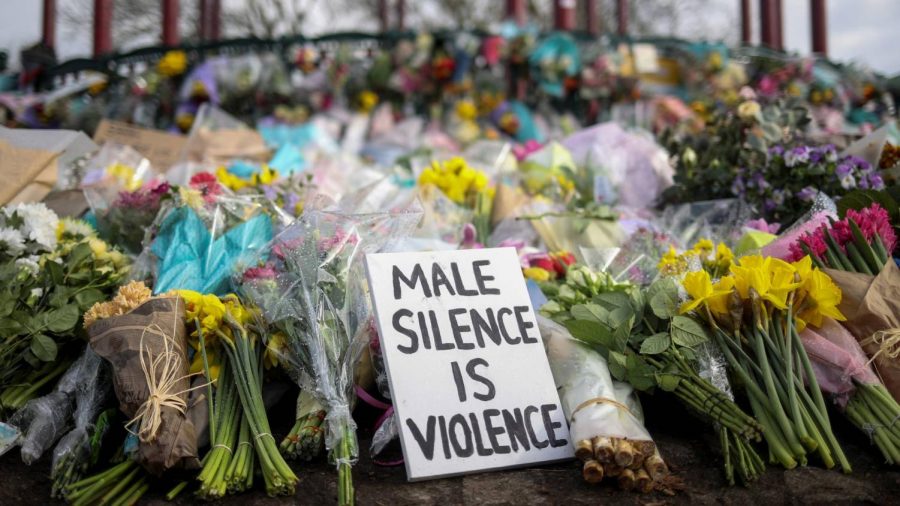Gender-Based Violence: Why Must Women Trade Their Freedom For Safety?
April 9, 2021
On March 3rd of 2021, Sarah Everard was murdered as she walked home from a new job in London. It was 9:30 at night when she vanished. Sarah took all the precautions that women constantly consider when walking alone. She walked only on well-lit streets, wore bright clothing, and even made a call to her boyfriend. However, none of this could have prevented the London Metropolitan police officer from murdering Sarah Everard. This devastating murder has brought yet another period of protest and activism to surface.
Women have always experienced some form of discrimination, sexism, or violence targeted towards them. This issue is not new. A social researcher, Jackson Katz, asked men what they typically do to avoid being sexually harassed. He then asked women. As you may guess, their responses differed greatly. As a chart that has gone viral on social media shows, most men respond with something along the lines of, “Nothing, I don’t really think about it.” Women, on the other hand, had a significant amount of responses. For example, “Hold my keys as a potential weapon,” “Check the backseat before getting in the car,” “Don’t go jogging at night,” “Carry mace/pepper spray,” “Have a male voice on my answering machine,” “Don’t wear headphones when jogging,” “Avoid wooden areas, even in the daytime,” “Only go out in groups,” “Watch what I wear,” and the list goes on. If this does not clearly show the difference between how men are treated in society versus how women are treated in society, I do not know what does. Feeling the need to filter the clothing that you wear, carry self defense weapons, stay inside at night, and be overly aware of your surroundings are things that men rarely have to be concerned about. Instead of giving suggestions to women about how they can protect themselves, we should be educating men about certain behaviors and language that may seem harmless, or even flattering, but that are actually perpetuating violence against women. There are countless men, believe it or not, who are part of the problem. It is necessary for men to be aware of how they may be worsening the issue as well as how they can help to resolve it. In order to stop violence against women, men need to step up and do their part.
most men respond with something along the lines of, “Nothing, I don’t really think about it.” Women, on the other hand, had a significant amount of responses. For example, “Hold my keys as a potential weapon,” “Check the backseat before getting in the car,” “Don’t go jogging at night,” “Carry mace/pepper spray,” “Have a male voice on my answering machine,” “Don’t wear headphones when jogging,” “Avoid wooden areas, even in the daytime,” “Only go out in groups,” “Watch what I wear,” and the list goes on. If this does not clearly show the difference between how men are treated in society versus how women are treated in society, I do not know what does. Feeling the need to filter the clothing that you wear, carry self defense weapons, stay inside at night, and be overly aware of your surroundings are things that men rarely have to be concerned about. Instead of giving suggestions to women about how they can protect themselves, we should be educating men about certain behaviors and language that may seem harmless, or even flattering, but that are actually perpetuating violence against women. There are countless men, believe it or not, who are part of the problem. It is necessary for men to be aware of how they may be worsening the issue as well as how they can help to resolve it. In order to stop violence against women, men need to step up and do their part.
A particular statistic, stating that 97% of women have been sexually harassed, caused outrage among people everywhere. Protests ensued, and the statement, “‘Not all men’, but it’s 3% away from being all women,” and others of similar content, were coined. The “Not all Men” hashtag soon became trending on multiple social media platforms. The phrase, “Not all Men”, is not only disruptive and, in a sense, ignorant, but it also invalidates women’s experiences, which is why it should not be used. The hashtag was largely trending to allow women to speak up, not to allow men to invalidate their experiences. If a woman discusses her experience of sexual harassment or violence, making the statement, “Not all men!” is unhelpful. This takes away from women that are trying to advocate for themselves. Additionally, saying something similar to, “But men are sexually harassed too!” turns the conversation to be about men. Any discussions about violence against women should not involve men’s issues, and discussing this violence does not disregard men’s issues. Instead, the statement “Not all Men,” completely misses the point of the conversation while demonstrating that you don’t care about women’s rights and don’t want to change. It also further proves the fragile state of masculinity, but that is another article.
Now, how can you help? The best thing to do is educate yourself and others, and spread awareness. Attend protests, support organizations against sexual harassment, and advocate in any way possible. Specific things that men can do to make women feel safer in public are as follows: keep a distance, do not stare, don’t run or come up to a woman from behind, keep any and all comments to yourself, offer to walk female friends home, be an active bystander, and keep your hands to yourself. These may seem obvious and straightforward, but they make a significant difference. If you are looking for specific accounts to follow or to assist in educating yourself and others, I would recommend @the_female_lead on Instagram, Twitter, and Tiktok. Do what you can.
The murder of Sarah Everard is one of many and should not go unnoticed. In her case, even the police were not enough to protect her. Whether it be educating yourself, spreading awareness, calling out predatory behavior, or listening and supporting women, everyone can do something to help prevent violence against women. It may not be all men, but it is 97% of women. She just wanted to go home.

























